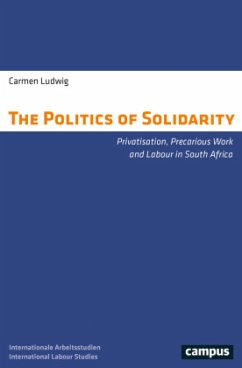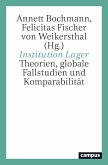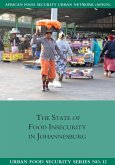- Broschiertes Buch
- Merkliste
- Auf die Merkliste
- Bewerten Bewerten
- Teilen
- Produkt teilen
- Produkterinnerung
- Produkterinnerung
Politische Transformation - und dann? 25 Jahre nach dem Ende der Apartheid sieht sich die südafrikanische Gesellschaft nach wie vor mit drastischen Ungleichheiten konfrontiert. Carmen Ludwig nimmt den Wandel öffentlicher Dienstleistungen im Post-Apartheid-Südafrika und die Auswirkungen der kommunalen Privatisierungen in den Blick. Sie zeigt anhand dreier Großstädte politische Konfliktlinien und lokale Gewerkschaftsstrategien im Spannungsfeld von in- und exklusiver Solidarität auf. Zudem stellt sie die Frage, wie es Gewerkschaften gelingen kann, Solidarität in fragmentierten Belegschaften herzustellen.…mehr
Andere Kunden interessierten sich auch für
![Erinnerung aus zweiter Hand Erinnerung aus zweiter Hand]() Julia SonnleitnerErinnerung aus zweiter Hand54,45 €
Julia SonnleitnerErinnerung aus zweiter Hand54,45 €![Die unbeabsichtigten Folgen der COVID-19-Pandemieabriegelung Die unbeabsichtigten Folgen der COVID-19-Pandemieabriegelung]() Lindiwe Z. TembaDie unbeabsichtigten Folgen der COVID-19-Pandemieabriegelung54,90 €
Lindiwe Z. TembaDie unbeabsichtigten Folgen der COVID-19-Pandemieabriegelung54,90 €![Leute machen Kleider: Ein Arbeitskampf indonesischer Textilarbeiterinnen zwischen Selbstorganisation und gewerkschaftlicher Organisierung Leute machen Kleider: Ein Arbeitskampf indonesischer Textilarbeiterinnen zwischen Selbstorganisation und gewerkschaftlicher Organisierung]() Anja EngelhornLeute machen Kleider: Ein Arbeitskampf indonesischer Textilarbeiterinnen zwischen Selbstorganisation und gewerkschaftlicher Organisierung52,00 €
Anja EngelhornLeute machen Kleider: Ein Arbeitskampf indonesischer Textilarbeiterinnen zwischen Selbstorganisation und gewerkschaftlicher Organisierung52,00 €![Institution Lager Institution Lager]() Annett BochmannInstitution Lager45,00 €
Annett BochmannInstitution Lager45,00 €![The State of Food Insecuritity in Johannesburg The State of Food Insecuritity in Johannesburg]() Michael RudolphThe State of Food Insecuritity in Johannesburg32,99 €
Michael RudolphThe State of Food Insecuritity in Johannesburg32,99 €![The Contentious Politics of Refugee and Migrant Protest and Solidarity Movements The Contentious Politics of Refugee and Migrant Protest and Solidarity Movements]() The Contentious Politics of Refugee and Migrant Protest and Solidarity Movements197,99 €
The Contentious Politics of Refugee and Migrant Protest and Solidarity Movements197,99 €![Has the Republic of South Africa¿s populace Reconciled with each other? Has the Republic of South Africa¿s populace Reconciled with each other?]() Thomas LataHas the Republic of South Africa¿s populace Reconciled with each other?78,99 €
Thomas LataHas the Republic of South Africa¿s populace Reconciled with each other?78,99 €-
-
Politische Transformation - und dann? 25 Jahre nach dem Ende der Apartheid sieht sich die südafrikanische Gesellschaft nach wie vor mit drastischen Ungleichheiten konfrontiert. Carmen Ludwig nimmt den Wandel öffentlicher Dienstleistungen im Post-Apartheid-Südafrika und die Auswirkungen der kommunalen Privatisierungen in den Blick. Sie zeigt anhand dreier Großstädte politische Konfliktlinien und lokale Gewerkschaftsstrategien im Spannungsfeld von in- und exklusiver Solidarität auf. Zudem stellt sie die Frage, wie es Gewerkschaften gelingen kann, Solidarität in fragmentierten Belegschaften herzustellen.
Produktdetails
- Produktdetails
- International Labour Studies 22
- Verlag: Campus Verlag
- Artikelnr. des Verlages: 51047
- Seitenzahl: 379
- Erscheinungstermin: 14. Juni 2019
- Deutsch, Englisch
- Abmessung: 214mm x 140mm x 23mm
- Gewicht: 473g
- ISBN-13: 9783593510477
- ISBN-10: 3593510472
- Artikelnr.: 54457318
- Herstellerkennzeichnung Die Herstellerinformationen sind derzeit nicht verfügbar.
- International Labour Studies 22
- Verlag: Campus Verlag
- Artikelnr. des Verlages: 51047
- Seitenzahl: 379
- Erscheinungstermin: 14. Juni 2019
- Deutsch, Englisch
- Abmessung: 214mm x 140mm x 23mm
- Gewicht: 473g
- ISBN-13: 9783593510477
- ISBN-10: 3593510472
- Artikelnr.: 54457318
- Herstellerkennzeichnung Die Herstellerinformationen sind derzeit nicht verfügbar.
Carmen Ludwig ist wiss. Mitarbeiterin an der Universität Gießen und assoz. Mitglied am Society, Work and Development Institute der Witwatersrand Universität Johannesburg.
Table of ContentsAcknowledgements 91 Introduction 131.1 Central Research Question and Aims of Research 161.2 Overview of the Book 182 Theoretical Framework: Solidarity and Trade Union Power Resources 212.1 Scales of Power: Conceptualising Workers' Power Resources 212.2 Power through Organisation 312.3 The Power to Disrupt Within and Outside the Workplace 352.4 Society as an Ally 372.5 The Dual Character of Institutional Power 402.6 Trade Union Strategies between Inclusive and Exclusive Solidarity 422.7 Interim Conclusion and Stages of Inquiry 443 Methodology and Research Design 473.1 Setting the Stage: The Selection of the Three Research Sites 483.2 Participant Observation and Problem-centred Interviews 513.3 Analysing the Field with the Extended Case Method 613.4 Conducting Research in a Contested Field 644 From Apartheid to Post-Apartheid: Labour in a Contested Terrain 694.1 Contesting the Labour Regime, Building Associational Power: A Brief History of the South African Labour Movement 694.2 From the Freedom Charter to GEAR: Conflicts within the Alliance on Macroeconomic Policy 784.3 Privatising Local Government: The Legislative Framework 834.4 The Fragmentation of the South African Labour Market: Core, Non-core, Periphery 894.5 The South African Labour Movement at a Crossroads 965 Privatisation and the Commodification of Public Services in Johannesburg and Cape Town 1055.1 The Post-Apartheid Challenge: Restructuring Johannesburg 1065.2 Hollowing out the local state: iGoli 2002 1105.3 The SAMWU Response to iGoli 2002 1165.4 Restructuring and Privatisation in Cape Town 1275.5 The SAMWU Response to Privatisation 1366 A Partial Inclusive Union Strategy: Organising a Fragmented Municipal Workforce in Johannesburg 1416.1 Facing the Divide: The increasing Fragmentation of the Workforce in Pikitup 1416.2 Contesting what a Labour Broker is: The Triangular Employment Relationship in Pikitup 1536.3 The Manufacturing of Insecurity in the Workplace 1606.4 The Pikitup Strike of 2011 1666.5 Failing Interactions between Contract Workers and SAMWU 1956.6 A Sense of Belonging: CWP Workers seeking Union Representation 2096.7 Interim Conclusion: A Partial Inclusive Strategy of Union Representation 2187 An Inclusive Union Strategy: Organising a Fragmented Municipal Workforce in Cape Town 2217.1 Confronting the Effects of Privatisation in Cape Town 2217.2 Experiences in Organising Workers in Private Waste Companies 2377.3 The Campaign against Labour Broking in Cape Town 2457.4 An Uphill Battle: Taking up the Struggle of EPWP Workers 2567.5 Mobilising Power Resources: Extending the Core 2887.6 Logistical Power and the Contested Post-Apartheid Order 2907.7 Discursive Power and the Legitimacy of Claims 2947.8 Labour and Community Alliances in Cape Town 2967.9 Interim Conclusion: An Inclusive Union Strategy 3028 An Exclusive Union Strategy: Organising a Fragmented Municipal Workforce in Ekurhuleni 3058.1 Conditions and Effects of Outsourcing in the Ekurhuleni Metropolitan Municipality 3058.2 "SAMWU we need our jobs back": Cleaning Workers in Ekurhuleni 3118.3 Alternative Forms of Organisation: The Casual Workers Advice Office in Germiston 3188.4 Exclusive Solidarity: SAMWU's Strategy towards Non-core Workers 3209 Conclusion 325Figures 335Tables 337Abbreviations 339References 342Index 377
Table of ContentsAcknowledgements 91 Introduction 131.1 Central Research Question and Aims of Research 161.2 Overview of the Book 182 Theoretical Framework: Solidarity and Trade Union Power Resources 212.1 Scales of Power: Conceptualising Workers' Power Resources 212.2 Power through Organisation 312.3 The Power to Disrupt Within and Outside the Workplace 352.4 Society as an Ally 372.5 The Dual Character of Institutional Power 402.6 Trade Union Strategies between Inclusive and Exclusive Solidarity 422.7 Interim Conclusion and Stages of Inquiry 443 Methodology and Research Design 473.1 Setting the Stage: The Selection of the Three Research Sites 483.2 Participant Observation and Problem-centred Interviews 513.3 Analysing the Field with the Extended Case Method 613.4 Conducting Research in a Contested Field 644 From Apartheid to Post-Apartheid: Labour in a Contested Terrain 694.1 Contesting the Labour Regime, Building Associational Power: A Brief History of the South African Labour Movement 694.2 From the Freedom Charter to GEAR: Conflicts within the Alliance on Macroeconomic Policy 784.3 Privatising Local Government: The Legislative Framework 834.4 The Fragmentation of the South African Labour Market: Core, Non-core, Periphery 894.5 The South African Labour Movement at a Crossroads 965 Privatisation and the Commodification of Public Services in Johannesburg and Cape Town 1055.1 The Post-Apartheid Challenge: Restructuring Johannesburg 1065.2 Hollowing out the local state: iGoli 2002 1105.3 The SAMWU Response to iGoli 2002 1165.4 Restructuring and Privatisation in Cape Town 1275.5 The SAMWU Response to Privatisation 1366 A Partial Inclusive Union Strategy: Organising a Fragmented Municipal Workforce in Johannesburg 1416.1 Facing the Divide: The increasing Fragmentation of the Workforce in Pikitup 1416.2 Contesting what a Labour Broker is: The Triangular Employment Relationship in Pikitup 1536.3 The Manufacturing of Insecurity in the Workplace 1606.4 The Pikitup Strike of 2011 1666.5 Failing Interactions between Contract Workers and SAMWU 1956.6 A Sense of Belonging: CWP Workers seeking Union Representation 2096.7 Interim Conclusion: A Partial Inclusive Strategy of Union Representation 2187 An Inclusive Union Strategy: Organising a Fragmented Municipal Workforce in Cape Town 2217.1 Confronting the Effects of Privatisation in Cape Town 2217.2 Experiences in Organising Workers in Private Waste Companies 2377.3 The Campaign against Labour Broking in Cape Town 2457.4 An Uphill Battle: Taking up the Struggle of EPWP Workers 2567.5 Mobilising Power Resources: Extending the Core 2887.6 Logistical Power and the Contested Post-Apartheid Order 2907.7 Discursive Power and the Legitimacy of Claims 2947.8 Labour and Community Alliances in Cape Town 2967.9 Interim Conclusion: An Inclusive Union Strategy 3028 An Exclusive Union Strategy: Organising a Fragmented Municipal Workforce in Ekurhuleni 3058.1 Conditions and Effects of Outsourcing in the Ekurhuleni Metropolitan Municipality 3058.2 "SAMWU we need our jobs back": Cleaning Workers in Ekurhuleni 3118.3 Alternative Forms of Organisation: The Casual Workers Advice Office in Germiston 3188.4 Exclusive Solidarity: SAMWU's Strategy towards Non-core Workers 3209 Conclusion 325Figures 335Tables 337Abbreviations 339References 342Index 377








